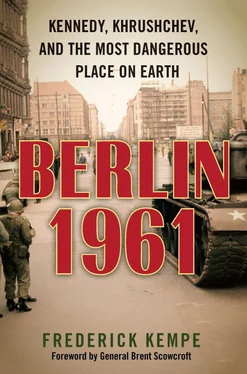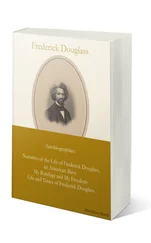“Take our tanks”: Oleg V. Volobuev and Alexei Serov, eds., Nikita Khrushchev: Life and Destiny . Moscow: Novosti Press, 1989, 27; Wyden, Wall , 264.
That said, the Soviets were nervous: Menning, “The Berlin Crisis of 1961 from the Perspective of the Soviet General Staff,” 141.
Clay’s view: Wyden, Wall , 263.
By late October, Bobby: James W. Symington, The Stately Game . New York: Macmillan, 1971, 144; Schlesinger, Robert Kennedy and His Times , 499–500.
The president’s brother made arrangements: JFKL, Robert F. Kennedy OH , Interview by John Bartlow Martin, March 1, 1964.
Bobby Kennedy recalled: Fursenko and Naftali, Khrushchev’s Cold War , 403–404.
The attorney general: JFKL, Robert F. Kennedy OH , Interview by John Bartlow Martin, March 1, 1964; Schlesinger, Robert Kennedy and His Times , 500.
On Friday night, October 27: FRUS, 1961–1963, vol. XIV, Berlin Crisis, 1961–1962, Doc. 197.
After an evening of tension: Nikita S. Khrushchev, Khrushchev Remembers: The Last Testament , 507.
Shortly after 10:30 a.m. on Saturday: Interview with Adam Kellett-Long, London, October 15–16, 2008; NPR interview: http://www.npr.org/templates/story/story.php?storyId=102618942.
“I recognize fully”: Harold Macmillan, At the End of the Day , 1961–1963. New York: Harper & Row, 1973, 182–183.
“There are many people”: JFKL, Kennedy Speech to Berliners, Rudolph Wilde Platz, West Berlin, June 26, 1963: http://www.jfklibrary.org/Historical+Resources/Archives/Reference+Desk/Speeches/JFK/003POF03BerlinWall06261963.htm.
The first scene unfolded: http://www.chronik-der-mauer.de/index.php/de/Start/Detail/id/593928/page/5; Berliner Morgenpost , 08/13/2006; Hilton, The Wall , 164–168.
At the same time…Soviet ships: Beschloss, Crisis Years , 412–415; Taubman, Khrushchev , 549–551; Fursenko and Naftali, Khrushchev’s Cold War , 451; Raymond L. Garthoff, Reflections on the Cuban Missile Crisis . Washington, D.C.: The Brookings Institution, 1987, 18–22, 208 (table showing type and numbers of missiles).
Fechter’s murder snapped something: “City’s Mood: Anger and Frustration,” New York Times , 08/26/1962.
Meanwhile, over Cuba: Anatoli I. Gribkov and William Y. Smith, “Operation Anadyr”: U.S. and Soviet Generals Recount the Cuban Missile Crisis . Chicago: Edition Q, 1994, 5–7, 24, 26–57; Taubman, Khrushchev , 550; Fursenko and Naftali, One Hell of a Gamble , 188–189, 191–193.
On August 22, the CIA: FRUS, 1961–1963, vol. X, Cuba, January 1961–September 1962, Doc. 383, Memo from the President’s Special Assistant (Schlesinger) to the President’s Special Assistant for National Security Affairs (Bundy), Washington, August 22, 1962, CIA, Office of Current Intelligence (OCI), No. 3047/62, Current Intelligence Memo, August 22, 1962: “Recent Soviet Military Aid to Cuba.”
Though history would celebrate Kennedy: Arnold L. Horelick, “The Cuban Missile Crisis: An Analysis of Soviet Calculations and Behavior,” World Politics , 16 (April 1964), 363–389; Graham T. Allison, Essence of Decision: Explaining the Cuban Missile Crisis . Boston: Little, Brown, 1971, 40–56, 102–117.
With that, the Arkansas senator: Smyser, Kennedy and the Berlin Wall , 90; JFKL, Bundy–JFK, August 4, 1961; Beschloss, The Crisis Years , 264; Larson, Deborah Welch. Anatomy of Mistrust: U.S.–Soviet Relations During the Cold War. Ithaca, NY: Cornell University Press, 2000, 134.
Without any countervailing presidential statement: Larson, Anatomy of Mistrust , 134.
“When the border is closed”: RGANI, Khrushchev–Ulbricht, August 1, 1961, Document No. 521557, 113–146. Document and citation graciously provided by Dr. Matthias Uhl.
Critics called Khrushchev’s scheme: Arkady N. Shevchenko, Breaking with Moscow. New York: Alfred A. Knopf, 1985, 117–118.
Regarding Cuba: Sergei N. Khrushchev, Creation of a Superpower , 536.
Despite all his first-year setbacks: John C. Ausland, Kennedy, Khrushchev, and the Berlin-Cuba Crisis, 1961–1964 . Oslo: Scandinavian University Press, 1996, 43–45; FRUS, 1961–1963, vol. XV, Berlin Crisis, 1962–1963, Doc. 34, Memcon, Bonn, April 13, 1962; also in Department of State, Central Files, 740.5/4-1362, Top Secret, Limit Distribution; Freedman, Kennedy’s Wars , 112–113.
Adenauer no longer could conceal: Schwarz, Konrad Adenauer . Vol. 2: The Statesman , 608; Archiv für Christlich-Demokratische Politik, Krone Diary, April 14, 1962.
He then shot off a brusque note: JFKL, NSF, Germany and Europe, Box 78; Rudolf Morsey and Hans-Peter Schwarz, eds., Adenauer: Briefe, 1961–1963 (Rhöndorfer Ausgabe), ed. Hans Peter Mensing, Stiftung Bundeskanzler-Adenauer-Haus, Paderborn, Germany: Ferdinand Schoeningh, 2006, 111.
Even as he put in place: FRUS, 1961–1963, vol. XV, Berlin Crisis, 1962–1963, Doc. 73, Message from Chairman Khrushchev to President Kennedy, Moscow, undated, but handwritten note: “Received at White House July 5, 1962”; also see Doc. 76: Memcon Rusk–Dobrynin, July 12, 1962; Department of State, Presidential Correspondence: Lot 77 D 163.
On September 4, Kennedy: Department of State Bulletin, vol. 47 (September 24, 1962), “U.S. Reaffirms Policy on Prevention of Aggressive Actions by Cuba: Statement by President Kennedy,” 450; also National Security Archives, Cuban Missile Crisis, President Kennedy’s Statement on Soviet Military Shipments to Cuba, September 4, 1962.
Two days later, on September 6: FRUS, 1961–1963, vol. XV, Berlin Crisis, 1962–1963, Doc. 112, Memcon between Secretary of the Interior Udall and Chairman Khrushchev, Pitsunda, Soviet Union, September 6, 1962.
On October 16, 1962: FRUS, 1961–1963, vol. XV, Berlin Crisis, 1962–1963, Doc. 133, Telegram from the Embassy in the Soviet Union to the Department of State, Moscow, October 16, 1962.
Khrushchev told his new ambassador: “The Cold War in the Third World and the Collapse of Detente in the 1970s,” “The Mikoyan–Castro Talks, 4–5 November 1962: The Cuban Version,” CWIHP-B, No. 8–9 (1996/1997), 320, 339–343: http://www.wilsoncenter.org/topics/pubs/ACF199.pdf.
“My thinking went like this”: Nikita S. Khrushchev, Khrushchev Remembers , 493–494.
Of all Khrushchev’s moves linking: John R. Mapother, “Berlin and the Cuban Crisis,” Foreign Intelligence Literary Scene , 12, no. 1 (January 1993), 1–3; Ray S. Cline, “Commentary: The Cuban Missile Crisis,” Foreign Affairs , 68, no. 4 (Fall 1989), 190–196.
Said Khrushchev, “The Americans knew”: Nikita S. Khrushchev, Khrushchev Remembers , 500.
“Let me just say a little”: Ernest R. May and Philip D. Zelikow, eds., The Kennedy Tapes: Inside the White House During the Cuban Missile . Cambridge, MA: The Belknap Press of Harvard University Press, 1997, 175.
“I recognize fully”: Macmillan, At the End of the Day , 182–183.
Kennedy repeated his Berlin concern: FRUS, 1961–1963, vol. XI, Cuban Missile Crisis and Aftermath, Doc. 39, Telegram from the Department of State to the Embassy in the United Kingdom, Washington, October 22, 1962, 12:17 a.m.; Macmillan, At the End of the Day , 186.
Читать дальше











